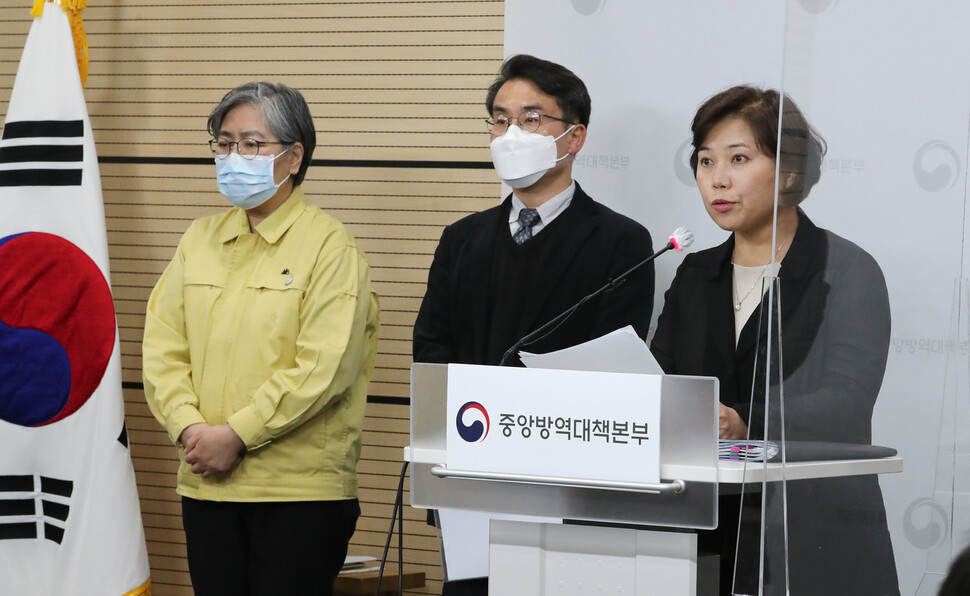93% of those under the age of 65 a month ago’agree’
President Moon’s couple, public vaccination on the 23rd
“To raise the consent rate of people with underlying diseases
Need to give benefits to the inoculators”

Choi Eun-hwa, chairman of the Vaccination Specialist Committee (right), explained the cases of blood coagulation disorders discovered after vaccination of AstraZeneca Corona 19 at a regular briefing on the domestic outbreak and vaccination status of Corona 19 held at the Centers for Disease Control and Prevention in Cheongju City, Chungbuk on the afternoon of the 22nd. have. On the left is Jung Eun-kyung, Director of the Centers for Disease Control and Prevention (Central Defense Response Headquarters) yunhap news
It was found that the rate of consent for AstraZeneca Corona 19 vaccine vaccination among elderly people 65 years of age or older in nursing hospitals and facilities, starting on the 23rd, was only 76.9%. Experts advised that in order to restore confidence in the AstraZeneca vaccine, it is time to make a turning point, such as participation of social leaders in vaccination. The Corona 19 Vaccination Response Promotion Team announced on the 22nd that 28,8365 people agreed to vaccination out of the 370,5061 hospitalized, residents, and workers aged 65 years or older across the nation in nursing hospitals and facilities. The consent rate is 76.9%. As of the 20th of last month, the consent rate of about 300,000 people under the age of 65 who received the AstraZeneca vaccine at the same facility was low compared to 93.6%. AstraZeneca vaccination was postponed once in Korea, saying that there was insufficient data to prove the effectiveness of the elderly over 65 years old, and it was interpreted that the situation that vaccination was discontinued and resumed due to a blood clot in major European countries could have overlapped effects. do. Korea Centers for Disease Control and Prevention (KCDC) Commissioner Jeong Eun-gyeong said, “I think the uneasy feelings of the people were reflected in the difference in the consent rate for vaccination (from one month ago). However, in this survey, the consent rate of inpatients and residents was 60-70%, but 90% of workers agreed. I see it as” he added. Rather than anxiety about specific vaccines, it is said that older age may reflect the characteristics of the underlying disease group. Experts advised that social leaders should actively initiate public vaccinations to restore confidence in the AstraZeneca vaccine, which has been repeatedly confirmed to be free from problems in preventive effect and safety. In particular, it is noteworthy whether the AstraZeneca vaccine on the 23rd by President Moon Jae-in and his wife will be a turning point in the recovery of trust. President Moon said in a headline speech at the chief and advisors meeting held at the Blue House that day, “I hope that the people will also respond to the vaccination without being suspicious of the safety of the vaccine.” “Vaccination protects the safety of our society as a whole while protecting our own safety. It’s also a way to keep it.” Jeong Jae-hoon, a professor at Gachon University’s medical school (preventative medicine), said, “The target who needs vaccination the most is the elderly with underlying diseases, but there is a problem that the consent rate has fallen to this level. “We need a plan to restore trust that meets the level of the public, such as vaccinating all of the social leaders,” he said. Ahn Do-hyun, president of the Korean Society of Health Communication (Professor of Journalism and Public Relations, Jeju National University) said, “The explanation that’profit overwhelms risk’ is a way of talking among scientists. The public should be told clearly, such as,’It is a lie to die if you get a vaccine.’ “There should be a lot of cases where celebrities that people identify with themselves, especially celebrities who interact with the public, are publicly vaccinated. I do,” he advised. Some pointed out that there is a need for a way to benefit the inoculations. Won-seok Choi, a professor at Korea University’s Ansan Hospital (Infectious Internal Medicine), said, “The AstraZeneca vaccine shows more than 70% prevention effect even with a single vaccination. Therefore, people who have been vaccinated can consider ways to make health differences, such as exempting self-isolation even if they have close contact with an infected person.” He added, “If the vaccination of the people who preceded it in priority is delayed, it is necessary to quickly move on to the next target group and show that it is actually safe.” Professor Jeong Jae-hoon said, “The introduction of a’vaccine passport’ that proves the vaccine vaccination fact and makes overseas travel more free can help to increase the vaccination rate.” On the other hand, a multinational pharmaceutical company AstraZeneca announced interim results that it showed 79% of COVID-19 infection prevention, 100% severe progression and hospitalization prevention effect in the AstraZeneca vaccine phase 3 clinical trial in the U.S. on the 22nd (local time). About 20% of the elderly aged 65 or older participated in the clinical trial involving 32,449 people of various races, and AstraZeneca said that it had an effect of preventing infection of more than 80% in these patients. In the safety evaluation, he explained that no evidence of an increase in thrombosis-related diseases was found in the vaccinated group, nor was it found to have cerebrovenous sinus thrombosis (CVST). AstraZeneca said it will submit clinical trial results to the US Food and Drug Administration (FDA) next week to obtain approval for emergency use in the United States. By Kim Ji-hoon, Seo Hye-mi, and Lee Wan, staff reporter [email protected]
